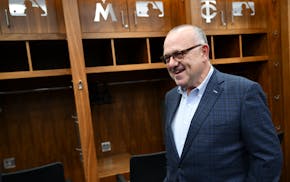By the time the Gophers baseball team finishes its Big Ten-opening series this weekend against Michigan, it will have been playing at home and entirely indoors for parts of three consecutive months. In the not-too-distant future, head coach John Anderson won't have that luxury -- but it's a trade-off he is willing to make, even if it might mean some logistical headaches. It's all part of a process involving multiple facilities and plenty of moving parts. The upshot is this: The Gophers are in the midst of a 27-game homestand at the Metrodome, which started Feb. 24 and will end Tuesday with a game against Augsburg. They are the Dome's primary baseball tenant now and will play all but two of their home games there this year, but with the Vikings gaining momentum to build a new football stadium on that site, such stretches might soon be a thing of the past.
The good thing for Anderson is that his long-fought battle for a new on-campus facility is very close to being a reality. The initial money needed to begin construction -- $7.5 million, most of it coming from fundraising -- is expected be in hand in the next couple of months. The ballpark is in the design phase now. It needs approval by the university Board of Regents, which would allow groundbreaking to start in June and the first phase of the new park to open in time for the Gophers to play there in 2013. The program is still working on raising an additional $7.5 million for other ballpark amenities.
"Don't put your wallets away," Anderson said. "We'll have additional work to do."
The new ballpark, even when complete, won't vault the Gophers to the top of the baseball facility arms race in the Big Ten. Penn State, for instance, spent more than $31 million on a new facility that was finished in 2006, while conference newcomer Nebraska spent a similar amount on its stadium. But Anderson, despite looming questions about weather and early-year scheduling, knows the big picture is a victory.
"The good news is being back on campus and connected to campus," said Anderson, whose squad will play one final game on May 1 at its old on-campus ballpark, Siebert Field. "It's mostly private money, and it speaks volumes to the story we were able to tell as well as the history and tradition of our program. It really inspired people to support us."
That history includes three national championships (1956, 1960, 1964) as well as NCAA regional appearances in three of the past five years. To what extent Minnesota (13-13) adds to that legacy this year remains to be seen. Pitching is the team's strength, but poor at-bats with runners in scoring position vexed Anderson in nonconference play.
"We've either struck out, had a bad plan or missed a pitch to hit," Anderson said. "It takes experience, and it's something you learn to do. I hope we'll improve in that area. If we do, I think we'll have a team that's able to contend down the stretch."
MICHAEL RAND

Reusse: Outgoing Twins President St. Peter was always right for the job

Craig: Here are the Vikings midseason awards

The Big List: More than 300 Minnesota recruits are set to commit to colleges

Twins moves: Falvey replaces St. Peter as team president; Zoll is new general manager
